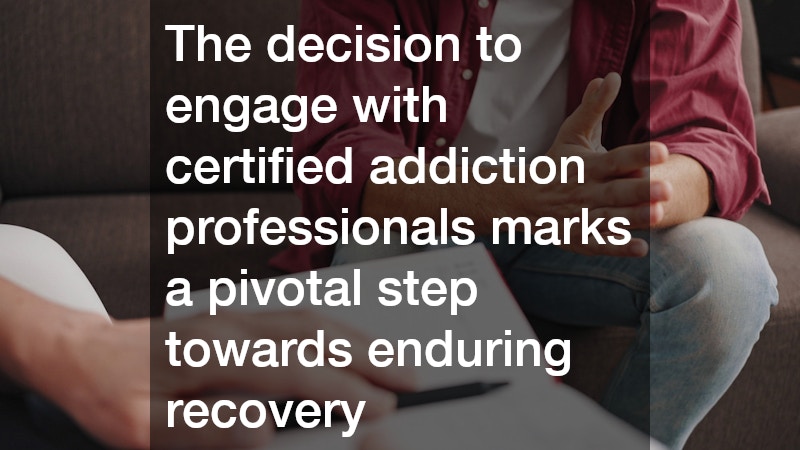In today’s world, the complexities of addiction recovery necessitate the involvement of trained professionals. Certified addiction professionals play a crucial role in guiding individuals and families through the daunting journey of overcoming addiction. They bring not only their expertise but also the necessary support and encouragement that can make a significant difference in recovery outcomes.
Addiction can affect every facet of an individual’s life, and addressing it properly requires more than just willpower. Certified addiction professionals offer specialized knowledge and skills, which can provide a more structured and effective approach to tackling addiction. For family members and loved ones, their involvement can also mean a reduction in stress and uncertainty as they navigate the recovery process.
What Qualifications Does a Certified Addiction Professional Have?
Educational Background
A certified addiction professional is typically equipped with extensive academic credentials. These professionals usually hold degrees in fields such as psychology, social work, or counseling, which provide them with foundational therapeutic knowledge. Furthermore, advanced degrees or specialized diplomas in addiction studies further solidify their expertise.
In addition to formal education, certified addiction professionals often participate in programs that emphasize practical skills in addiction treatment. This educational path ensures that they are well-versed in understanding the psychological, social, and biological aspects of addiction. Their academic background thus endows them with the skills necessary to address diverse addiction scenarios effectively.
Certification and Licensure
Certification and licensure are critical in establishing the credibility of addiction professionals. Credentials such as the CADC (Certified Alcohol and Drug Counselor) are widely recognized and set standard requirements for competency. This not only reassures clients of the professional’s expertise but also aligns with industry benchmarks.
The process of obtaining these credentials involves rigorous testing and validation of one’s skills and knowledge. Certified addiction professionals undergo assessments that cover a wide range of treatment methodologies and ethical practices. This level of scrutiny ensures that they maintain a high standard of care in their professional conduct.
Ongoing Training and Development
Ongoing training is a vital component for certified addiction professionals, helping them stay informed about the latest treatment techniques. Recovery science is an ever-evolving field, with new evidence-based methods emerging regularly. Professionals committed to continuous training can leverage these new techniques for more effective treatment results.
Continuous learning opportunities include workshops, seminars, and specialized training sessions, which provide fresh insights and competencies. By staying informed, addiction professionals are better equipped to tailor interventions that meet evolving patient needs. This focus on lifelong learning distinguishes certified professionals from those who may not engage in such rigorous educational upkeep.
How Can a Certified Addiction Professional Help in Recovery?
Personalized Treatment Plans
Certified addiction professionals excel in creating personalized treatment plans that cater to the unique needs of each client. They meticulously assess the individual’s history, type of addiction, and personal circumstances to determine the most suitable approach. This flexibility enhances the relevance and effectiveness of the treatment provided.
Personalization is critical, as it acknowledges the unique factors influencing each individual’s addiction. Such tailored treatment plans are more likely to yield positive outcomes, as they resonate more closely with the client’s reality. Personalized plans enable clients to engage more fully in the recovery process, enhancing commitment and perseverance.
Comprehensive Support Network
Establishing a comprehensive support network is another crucial service that certified addiction professionals provide. They act as the central node connecting clients to a broader network of support, including family members, healthcare providers, and support groups. This integration ensures that the client receives support from multiple directions.
Crisis Management and Intervention
Crisis management is a critical skill that certified addiction professionals possess, allowing them to intervene effectively during emergencies. With their expert training, they can identify signs of a crisis early and respond with appropriate strategies. This readiness is vital in preventing setbacks and ensuring continued progress on the recovery path.
Professionals are equipped with the necessary skills to de-escalate situations that could potentially jeopardize recovery. Their intervention strategies are rooted in sound psychological principles and practical experience. This integrated approach to crisis management ensures that clients are supported comprehensively, minimizing the emotional and physical impacts of a crisis.
What Are the Benefits of Hiring a Certified Professional Versus Other Options?
Evidence-Based Practices
Evidence-based practices are cornerstones of the treatment strategies employed by certified addiction professionals. These are methods that have been scientifically tested and proven effective in managing addiction. The use of such practices ensures that clients receive care that is backed by solid research and statistical outcomes.
Accountability and Ethical Practices
The ethical standards to which certified addiction professionals adhere ensure that they maintain accountability in their practice. Their work is governed by codes of conduct that prioritize patient safety, confidentiality, and respect. Adherence to these principles creates a trustworthy and secure environment for clients.
Holistic Approach to Recovery
A holistic approach is essential in addressing addiction comprehensively, considering the individual as a whole. Certified professionals understand that addiction impacts physical, emotional, and social facets of a person’s life. Thus, they integrate various strategies to address these multiple dimensions effectively.
Employing the services of a certified addiction professional offers numerous benefits that can significantly enhance the recovery process. From personalized care plans and evidence-based practices to crisis management and ethical accountability, certified professionals provide comprehensive support. Their holistic approaches address the complexity of addiction, offering clients a better chance at reclaiming their lives.
As addiction recovery remains an intricate and demanding process, hiring a certified professional becomes an indispensable asset. Their involvement makes a marked difference, guiding clients and families towards a promising future free from the chains of addiction. Conclusively, the decision to engage with certified addiction professionals marks a pivotal step towards enduring recovery and meaningful change.
.





